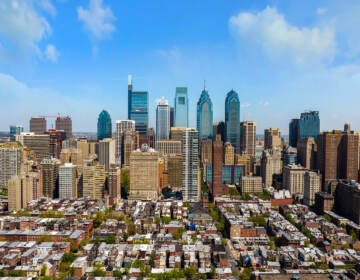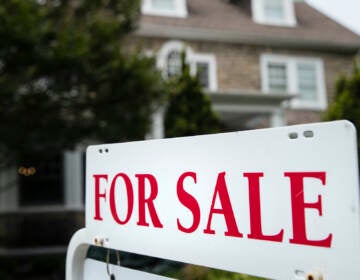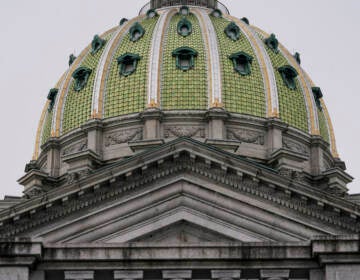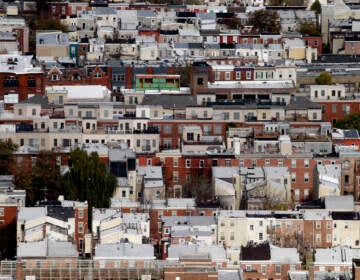Many still facing property tax hike, despite Philly’s revised homestead program
The homestead exemption increases to $80,000, but not everyone will benefit the same. Over 130,000 property owners are still slated to pay more in property taxes.
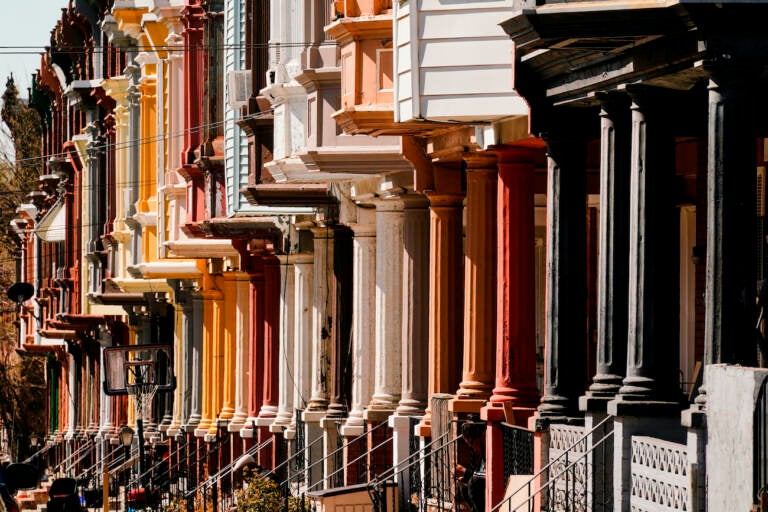
Shown are row houses in Philadelphia, Friday, April 8, 2022. (AP Photo/Matt Rourke)
A sizable subsection of Philadelphia property owners may be less-than-thrilled when they get their next property tax bill in December.
Despite the city raising the homestead exemption, a popular tax break, from $45,000 to $80,000, they’ll still owe more than they did during the last tax year, if their property assessments don’t change on appeal, according to data provided by the city.
The mean difference between the two bills is $225. Half will pay more, half less, with some laying out just $1 more and others slated to pay more than $1,000 in additional taxes.
Overall, more than 130,000 property owners — more than 60% of those already in line to receive an $80,000 exemption — are poised to shell out more in property taxes, according to the same city data.
(Now that Mayor Kenney has signed the enabling legislation, individual homestead values will automatically jump to $80,000 for those currently enrolled in the program at $45,000).
During the first half of September, the city is expected to start mailing new property assessments, the first in three years. Residential property values went up by an average of 31%, prompting city lawmakers and the Kenney administration to push solutions aimed at reducing property taxes, particularly for Black and Latino homeowners in rapidly gentrifying sections of Philadelphia.
It’s why amending the homestead program became central to last month’s budget agreement between the administration and City Council. Mayor Kenney wanted to raise the deduction to $65,000. Members of Council, including Councilmember Kenyatta Johnson, wanted to raise it to $90,000, the state maximum.
In the end, the sides settled on $80,000.
Johnson, who pushed the increase as part of his “Save our Homes” plan, said raising the homestead exemption helps those who need it most — people, as he put it, making the choice between paying for daycare for their children and paying their property taxes so they can keep a roof over their head.
“This tax relief proposal, it will allow for everyone to have some level of benefit. But at the end of the day, we want to make sure that individuals who are most vulnerable, predominantly in Black and brown neighborhoods, which are gentrified, we want to make sure they don’t lose their homes,” said Johnson.
In an email, mayoral spokesperson Kevin Lessard echoed that sentiment, saying the goal of the new homestead exemption is to “reduce the impact of the assessment increase, particularly to those most impacted, but not necessarily to eliminate all increases.”
“The City also included relief measures other than homesteads so just looking at homesteads doesn’t capture everything we did to help property owners,” said Lessard.
Johnson’s “Save Our Homes” plan also included changes to another pair of longstanding tax relief programs —- the Longtime Owner Occupants Program (LOOP) and the Low-Income Senior Citizen Real Estate Tax Freeze.
Mayor Kenney signed the bills into law during a Wednesday afternoon ceremony at City Hall.
Separately, the city has set aside at least $2 million for a new cash assistance program for Philadelphia homeowners who aren’t eligible for existing tax relief programs.
“There’s still gonna be some people who fall through the cracks,” said City Council President Darrell Clarke on Wednesday. He would not provide more details about the forthcoming fund.
LOOP is designed to protect low-to-moderate income homeowners from being displaced from swiftly gentrifying neighborhoods. The new measure expands the program’s eligibility requirements by removing the homestead exemption from the equation. Homeowners can now have their property value capped as long as their assessment went up by at least 50% in one tax year. The revamped program also enables homeowners to participate if their property value increased by at least 75% over the course of five tax years.
A separate bill allows income qualifying homeowners to retroactively enroll in the senior freeze program, which is generally for residents who are 65 and older. This means that if someone is 70, they can freeze their assessment and the value it was the tax year they first became eligible for the program.
The caveat: Property owners cannot be enrolled in the homestead exemption program and LOOP. That means some homeowners will have to make a choice between the short-term savings of the homestead exemption and the long-term savings of the LOOP program, said Kate Dugan, a staff attorney in the home ownership unit at Community Legal Services.
“It’s certainly frustrating to tell a client that they should pay higher taxes this year to insulate themselves against potentially paying higher taxes in future years, But that’s kind of what we have to tell them,” said Dugan.

Subscribe to PlanPhilly
WHYY is your source for fact-based, in-depth journalism and information. As a nonprofit organization, we rely on financial support from readers like you. Please give today.




